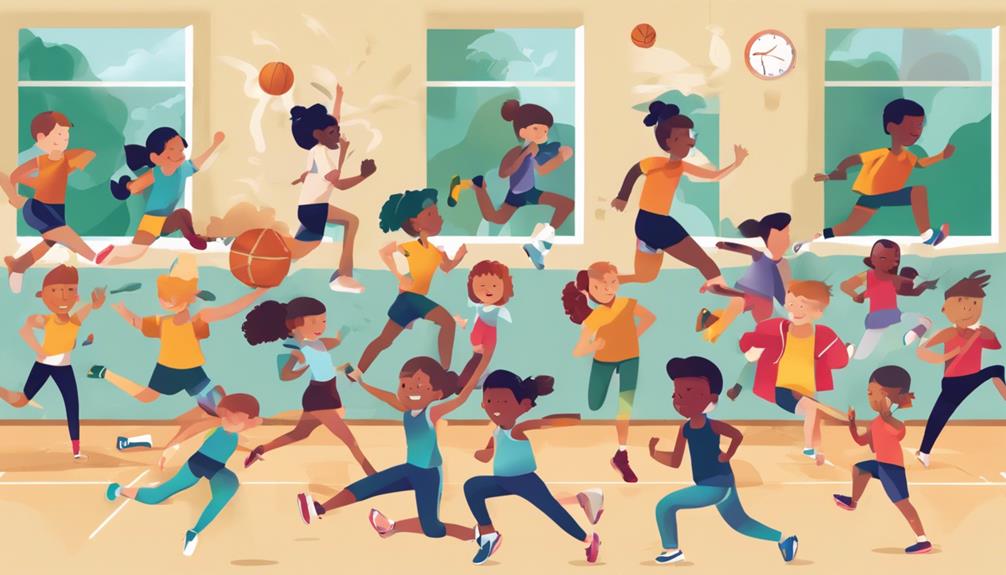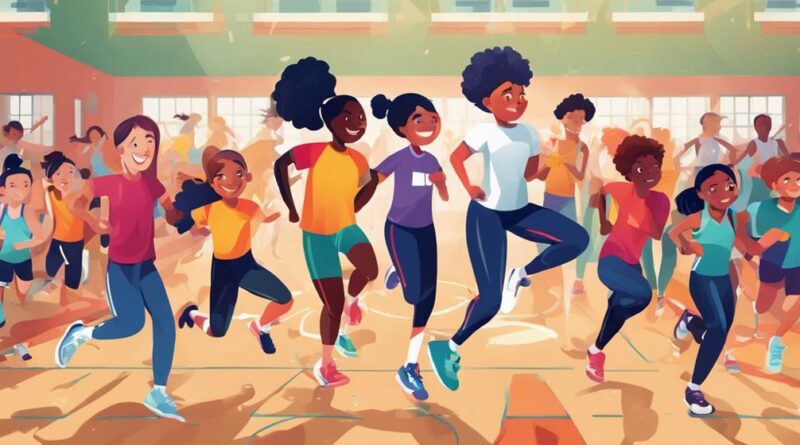5 Best Benefits of Athletics in Physical Education
When it comes to physical education, the saying 'practice makes perfect' holds true, especially in the realm of athletics. Engaging in sports not only boosts your physical fitness but also hones your teamwork and collaboration skills.
But the benefits don't stop there. The mental health advantages, leadership qualities, and self-confidence that can be gained through participation in athletics are truly invaluable.
Interested in uncovering more ways in which athletics can positively impact your overall well-being and personal growth?
Improved Physical Fitness
Improved physical fitness is a key outcome of engaging in athletics within the physical education curriculum. By participating in sports activities, such as running, swimming, or basketball, you can significantly enhance your cardiovascular endurance. These activities get your heart pumping, improving its ability to deliver oxygen-rich blood to your muscles efficiently. This boost in cardiovascular endurance not only benefits your athletic performance but also enhances your overall health.
Moreover, engaging in athletics helps in developing muscle strength. Activities like weightlifting, push-ups, and squats work various muscle groups, leading to increased muscle mass and strength. Building muscle strength is essential not only for athletic success but also for performing daily tasks with ease and reducing the risk of injuries. Strong muscles support your joints and bones, improving your overall body mechanics and posture.
Incorporating athletics into your physical education curriculum is a fun and effective way to improve your physical fitness. Whether you're striving to enhance your cardiovascular endurance or increase your muscle strength, participating in sports activities regularly can help you achieve your fitness goals. So, lace up your sneakers, grab a ball, and get ready to experience the positive impact of athletics on your physical well-being.
Teamwork and Collaboration Skills
Regularly engaging in athletics in physical education classes fosters valuable teamwork and collaboration skills among participants. Through activities like team sports, relay races, and group exercises, you have the opportunity to develop essential communication strategies, problem-solving techniques, conflict resolution, and decision-making skills.
In team sports such as basketball or soccer, effective communication is key to success. You learn to convey your ideas clearly to your teammates, coordinate plays, and adjust strategies on the fly. This improves not only your verbal communication but also your ability to understand non-verbal cues and work together seamlessly towards a common goal.
Moreover, engaging in group exercises requires problem-solving techniques and decision-making skills. You must strategize with your team to overcome obstacles, adapt to changing circumstances, and make quick decisions under pressure. These experiences translate beyond the sports field and into real-life situations where teamwork and collaboration are essential.
Conflict resolution is another crucial aspect of teamwork in athletics. Learning to resolve disagreements, manage different personalities, and find common ground with your teammates fosters a positive team dynamic and enhances your ability to navigate conflicts constructively.
Enhanced Mental Health
How can engaging in athletics in physical education classes contribute to your mental health?
Engaging in athletics during physical education classes can significantly benefit your mental health by helping you manage stress more effectively and improving your cognitive function.
Physical activity through athletics is a natural way to reduce stress and improve your overall mood. When you participate in sports or other forms of physical activity, your body releases endorphins, which are chemicals that act as natural painkillers and mood elevators. This release of endorphins can help reduce feelings of stress and anxiety, leaving you feeling more relaxed and content.
Moreover, engaging in athletics can also enhance your cognitive function. Regular participation in physical activities has been linked to improved concentration, sharper memory, and faster learning. By challenging your brain to coordinate movements, make quick decisions, and strategize during athletic activities, you're essentially giving your cognitive function a workout, leading to better mental performance in other areas of your life as well.
Development of Leadership Qualities
Engaging in athletics in physical education classes not only benefits your mental health but also fosters the development of leadership qualities through active participation and teamwork. By participating in sports activities, you enhance your problem-solving skills by strategizing during games and overcoming obstacles in real-time. This ability to think on your feet and make quick decisions translates directly into leadership qualities, where being able to assess a situation and come up with effective solutions is crucial.
Moreover, communication abilities are honed through sports as you learn to effectively convey ideas, listen to teammates, and coordinate strategies. Strong communication is a key component of leadership, enabling you to articulate your vision, motivate others, and work collaboratively towards a common goal. Additionally, participating in team sports cultivates decision-making skills and strategic thinking. You learn to analyze different scenarios, anticipate outcomes, and make informed choices under pressure, all of which are vital aspects of effective leadership.
Increased Self-Confidence
Participating in athletics in physical education classes can significantly boost your self-confidence levels as you push yourself to achieve personal goals and witness your progress firsthand. Engaging in sports activities helps in building resilience by exposing you to challenges that require determination and perseverance to overcome. As you face obstacles during training or competitions, you learn to bounce back from setbacks, becoming more confident in your ability to tackle difficult situations.
Moreover, the process of setting and working towards athletic goals plays a vital role in boosting motivation. When you establish specific targets such as improving your running time or mastering a new skill in a sport, you're motivated to put in the effort and dedication needed to accomplish these objectives. As you make progress and see your hard work paying off, your self-assurance grows, leading to an overall increase in self-confidence.
Stress Reduction and Emotional Well-being
Experiencing the positive effects of increased self-confidence through athletics can also contribute to reducing stress levels and enhancing emotional well-being. Engaging in physical activity creates a strong mind-body connection, allowing you to better understand and regulate your emotions. This connection helps in managing stress more effectively, leading to improved emotional stability and well-being.
- Mind-Body Connection: Through athletics, you learn to listen to your body's signals, connecting physical sensations with emotional states. This awareness can help you address and alleviate stress more efficiently.
- Mood Boost: Exercise triggers the release of endorphins, often referred to as the body's natural mood boosters. These chemicals help combat feelings of anxiety and depression, promoting a more positive emotional state.
- Stress Relief: Physical activity serves as an outlet for releasing pent-up tension and stress. Whether it's through a challenging workout or a team sport, engaging in athletics can provide a much-needed break from daily stressors, allowing you to unwind and recharge.
Promotion of Healthy Habits

To develop healthy habits, prioritize consistency and balance in your physical activities. Engaging in regular exercise routines and maintaining a well-rounded approach to fitness are key components of promoting healthy habits. Through participation in athletics as part of physical education, you have the opportunity to not only improve your physical health but also to cultivate habits that contribute to your overall well-being.
Health education plays a crucial role in guiding you towards making informed decisions about your wellness practices. By learning about the benefits of different types of exercises and the importance of nutrition, you can make choices that support a healthy lifestyle. Incorporating these lessons into your daily routine can lead to long-term health benefits.
Wellness practices such as setting achievable fitness goals, staying hydrated, and getting an adequate amount of rest are essential aspects of promoting healthy habits. By integrating these practices into your athletic endeavors, you can enhance your performance, prevent injuries, and improve your overall quality of life.
Social Skills Development
Developing strong social skills through athletics enhances your ability to communicate effectively and collaborate with others in a team setting. Participating in sports not only improves your physical health but also nurtures essential communication skills. In a team environment, you learn to convey your thoughts clearly, listen actively to others, and provide constructive feedback. These skills are invaluable not only in sports but also in various aspects of your personal and professional life.
- Communication skills: Engaging in athletics requires effective communication to strategize, coordinate movements, and support teammates. This constant communication fosters the development of clear and concise ways to convey information.
- Conflict resolution: Sports often present situations where conflicts arise, such as disagreements on tactics or decisions. Learning to navigate these conflicts peacefully and find solutions is a crucial skill that can be honed through athletics.
- Teamwork: Athletics teach you the importance of working together towards a common goal. You learn to trust your teammates, delegate tasks, and contribute your skills for the benefit of the whole team.
Frequently Asked Questions
How Can Athletics in Physical Education Impact Academic Performance and Cognitive Development?
Engaging in athletics during physical education can positively impact academic performance and cognitive development. By participating in sports, you not only improve physical health but also enhance mental acuity. Regular exercise boosts mood, focus, and memory, leading to better academic outcomes.
Additionally, the discipline and teamwork learned through athletics can translate into improved problem-solving skills and increased cognitive abilities. So, lace up those sneakers and get ready to excel both on and off the field!
What Role Do Athletic Programs Play in Improving Overall School Culture and Student Engagement?
Athletic programs can have a significant impact on school culture by fostering school spirit and boosting student engagement. When students participate in sports, they often develop a sense of pride in their school and teamwork skills. This can create a more positive and inclusive atmosphere, encouraging students to be more involved in school activities and events.
Additionally, the motivation that comes from being part of a team can lead to increased academic performance and overall well-being.
Are There Any Specific Sports or Activities That Are Better Suited for Certain Physical or Mental Health Benefits?
When it comes to sports and activities, certain ones offer unique benefits for your physical and mental health. Each sport has its own set of advantages, such as building strength, improving endurance, enhancing flexibility, and boosting mood.
How Can Coaches and Instructors Incorporate Diversity and Inclusion Initiatives Within Athletic Programs?
When coaching, focus on inclusive practices and diversity initiatives to create an equitable environment. Implement team-building activities that foster unity among athletes. Offer equity training to coaches and instructors to ensure fair opportunities for all participants.
Can Athletics in Physical Education Help Students Develop Skills for Future Career Success and Professional Growth?
Engaging in athletics during physical education classes can boost your career readiness by developing essential skills like teamwork, leadership, and time management. These capabilities are transferable to various professions and contribute to your professional growth.
Conclusion
So, as you can see, participating in athletics in physical education classes offers a wide range of benefits. From improved physical fitness and teamwork skills to enhanced mental health and leadership qualities, there are countless reasons to get involved.
Not to mention the boost in self-confidence, stress reduction, and promotion of healthy habits.
So next time you have the opportunity to participate in athletics, don't hesitate to jump in and reap the rewards!
